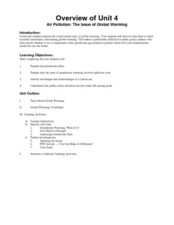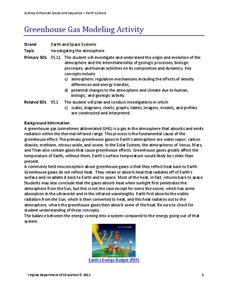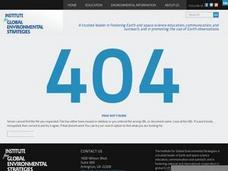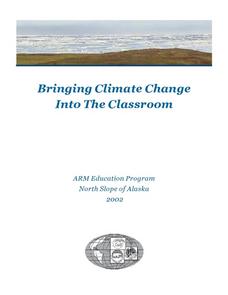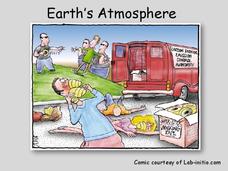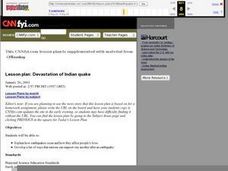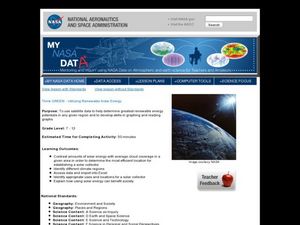Radiation Teacher Resources
Find Radiation lesson plans and worksheets
Showing 465 resources
MinuteEarth
How Do Greenhouse Gases Actually Work?
Why does the temperature on the moon get so much hotter and colder than the temperature on the earth? The video answers this question and many more. It incorporates a discussion of the importance of atmosphere and how greenhouse gases...
Savvas Learning
Let's Get Moving
Scholars examine, cut, paste, and sort 12 images featuring different types of movement in order to show what they know about energy—potential and kinetic.
American Association for the Advancement of Science
Sensing the Invisible: The Herschel Experiment
Learners of light will construct a contraption in which light is passed through a prism and shone into a box. The temperatures at different points along the path and outside of the path of light. The intent is to imitate William...
Curated OER
The Absorption of Solar Energy
Two sequential parts to this lesson introduce your class to the electromagnetic spectrum, the ability to absorb radiant energy, and the pigments in leaves that are responsible for collecting sunlight to be used in the photosynthetic...
McAuliffe-Shepard Discovery Center
Global Warming in a Jar
This well-organized lab activity introduces earth science pupils to the greenhouse effect. They will set up two experiments to monitor temperatures in an open jar, a closed jar, and a closed jar containing water. Ideally, you would have...
National Wildlife Federation
I’ve Got the POWER! Solar Energy Potential at Your School
Should every school have solar panels? The 19th lesson in a series of 21 has scholars research the feasibility of using solar panels at their school. They begin by gathering data on the solar energy in the area before estimating the...
US Environmental Protection Agency
Sea Level: On the Rise
With the global temperature on the rise, the effects of climate change are starting to be seen. However, many people have a difficult time conceptualizing the long-term effects, such as sea levels rising. Given an easy and effective...
Curated OER
Air Pollution: The Issue of Global Warming
Here is an outstanding 10-page lesson plan on global warming. Learners discover that there is a lot of controversy surrounding this topic in that the science behind global warming is difficult to prove. The best thing about this plan is...
Texas State Energy Conservation Office
Global Climate Change
Here is an extensive reading resource that addresses our climate change crisis. It thoroughly explains the greenhouse effect, related Earth cycles, and the history of climate change. Use it as part of the intended unit, published by the...
Virginia Department of Education
Greenhouse Gas Modeling Activity
Why are greenhouse gases called greenhouse gases? Young Earth scientists learn about greenhouse gases though experimentation in the second installment of a 3-part series. They use lamps to model radiant energy as well...
Science Matters
Energy and Winds
In the study of wind energy, scholars build a small windmill and observe how it transfers wind into mechanical energy. Learners will make connections to the previous lesson plan with concepts such as the creation of wind...
MinuteEarth
The Hottest Place on Earth
Where is the hottest place on Earth, and how can scientists prove it? The video discusses multiple methods for measuring the temperatures across the planet. Then it discusses the hottest places measured by each method and their accuracy....
Curated OER
CO2 and You
Students study the scientific evidence about carbon dioxide emissions. They learn to calculate the amount of energy used by different appliances. They complete a worksheet which analyzes the amount of energy that their home uses.
Curated OER
Bringing Climate Change Into the Classroom
Students investigate the greenhouse effect and examine the potential effects of climate change in the Arctic. They construct a mini-greenhouse and test its effect on temperature, analyze historical climate statistics, and conduct an...
Glynn County School System
Multi-Wavelength Astronomy
Take a look at astronomy through the light lens. From radio to gamma, light waves exist in every corner of the universe. An enlightening PowerPoint presentation gives an overview of the different categories of light and then discusses...
Curated OER
More on Conduction and Convection
Why do some items feel colder when they are the same temperature? How should you keep your soda cold? What makes the wind blow? These are just some of the things middle schoolers discover when completing a activity on...
Curated OER
Does Humidity Affect Cloud Formation?
Students use S'COOL data to identify factors that affect cloud formation. They find a data set using the S'COOL database , and use Excel to manipulate the data. Student isolate relevant data, create meaningful graphs from a spreadsheet,...
Curated OER
The Greenhouse Effect
In this Earth Science worksheet, students read about the Greenhouse Effect and the difference between natural and amplified warming. Following, they answer ten short answer questions related to what they read about global climate issues.
American Museum of Natural History
What is the Greenhouse Effect?
Without the greenhouse effect, Earth would not be inhabitable. A thorough online resource describes the greenhouse effect and how it occurs. The source highlights the different types of gases that work together to absorb the sun's...
American Museum of Natural History
Make a Terrarium
Scholars read a brief overview of what a terrarium is and how it creates the greenhouse effect, then click on a link to discover the materials and 10 steps they need to build their own.
Science Geek
Earth's Atmosphere
Ozone gas absorbs the harmful UV-B rays and helps protect humans. An informative presentation begins with the layers of the earth's atmosphere, the pressure and temperature in each of the layers, the ozone layer, the ozone cycle,...
Curated OER
Devastation of Indian Quake
Students read an online article at CNNfyi.com to determine what happened in India after an earthquake. They determine the magnitude of this earthquake and address the issue of relief efforts from other countries.
Curated OER
Think GREEN - Utilizing Renewable Solar Energy
Students use data to find the best renewable energy potential. For this solar energy lesson students import data into Excel and explain how solar energy is beneficial.
Be Smart
What Is Fire?
Fire is both dangerous and amazing. Allow your class to gain a more meaningful understanding of this natural phenomenon as they view a short video segment on the chemistry and physics of fire. Pupils learn why a fire burns, how fires...









